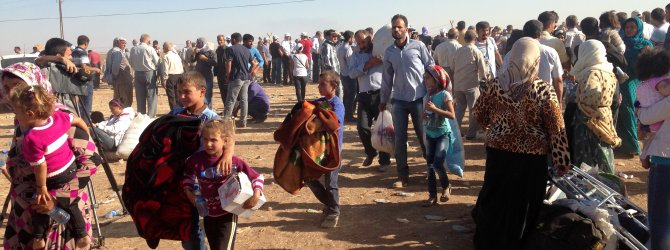-
Europe Should Lead by Example and Bring International ...
Europe Should Lead by Example and Bring International Refugee Policy into the 21st Century

Europe’s failure towards the refugees at its borders is finally receiving the attention it deserves. This is an historic moment which offers European leaders the opportunity to make a serious impact, not only on the lives of those who have survived perilous journeys to the continent, but on the relevance of international refugee policy in the 21st Century. To achieve this, Europe must pursue genuine partnerships with host states in regions of origin, in addition to making financial contributions through ordinary humanitarian channels.
The spotlight is on Europe, but much of the attention continues to emphasise issues of resettlement, border enforcement and procedural aspects of EU asylum policy. Although important, these are not the main areas that Europe needs to address to deal with the current crisis effectively. Resettlement is not the most cost-effective way of providing protection to refugees; moreover, the scale of resettlement, compared with the size of the population influxes in countries like Lebanon, Turkey and Jordan, may not be large enough to have a significant impact on the overall crisis. After the initial euphoria over Angela Merkel’s decision to bypass the Dublin Regulation and allow refugees to enter Germany, the atmosphere in Europe is increasingly one of confusion and right-wing populism. Borders are closing across the Schengen Area and the emergency meeting of interior ministers on 14th September raised measures that could effectively outsource the refugee problem to countries outside of Europe. Much less attention has been paid to the root causes of Europe’s current refugee crisis, yet it is only from here that more reasonable and effective response strategies can emerge.
One of the principal reasons that refugees are willing to take the severe risks associated with the journey to Europe is lack of adequate support to host countries. International refugee law imposes strict obligations on host states of first asylum through the principle of non-refoulement, but does not match this with equal obligations for international burden-sharing. The effect of this imbalance is clearly discernible in countries such as Jordan, Turkey and Lebanon: as the situation becomes more protracted, support from donors dwindles and host states are increasingly left to manage the situation alone. This situation exacerbates the hardships faced by refugees and drives them to look for better protection elsewhere. The World Food Programme’s recently announced cuts to its food voucher program for Syrian refugees is emblematic of wider funding shortfalls across humanitarian agencies.
The international community could have mitigated the crisis facing Europe today by investing more financial contributions, more smartly, in regional host states at the beginning of the crisis. As a result of this failure, Europe now has tough choices to make and the coming months will no doubt witness a significant test of the resilience of the European project itself. However, Europe also has a unique opportunity to pursue more effective response strategies to the broader Syrian refugee crisis and in the process influence the tangibility of international refugee policy. It is likely that the focus will shift from resettlement to greater support for host countries. Indeed, this is the message that the British Prime Minister, David Cameron, brought with him on a recent visit to Lebanon and Jordan and on which he is urging other EU nations to follow suit. This is certainly a politically expedient strategy for the Cameron government and others opposed to greater resettlement in Europe, but, under the right conditions, boosting such assistance could begin to address the root causes of refugees risking all to travel to Europe.
So what would the ‘right conditions’ look like? Simply throwing more money at the problem is unlikely to work. Sustainable solutions need to be premised upon genuine partnerships with host countries in the region, wherein all parties commit to broad initiatives that will work to their mutual advantage. In the case of Jordan, our research suggests that, with the proper support, the country could begin to address macro-economic policy goals whilst simultaneously addressing humanitarian gaps by opening up employment opportunities to Syrian refugees. This would require developed countries in Europe and elsewhere to play a central role by incentivising increased investment in Jordan from the private sector. But if Europe is serious about dealing with the current crisis effectively, and in a manner that upholds the core values of the Union, it must be willing to take bold and innovative measures. Further, European leadership at this juncture has the potential to set new standards for burden-sharing that better correspond to the complexity of refugee crises in the 21st Century.

